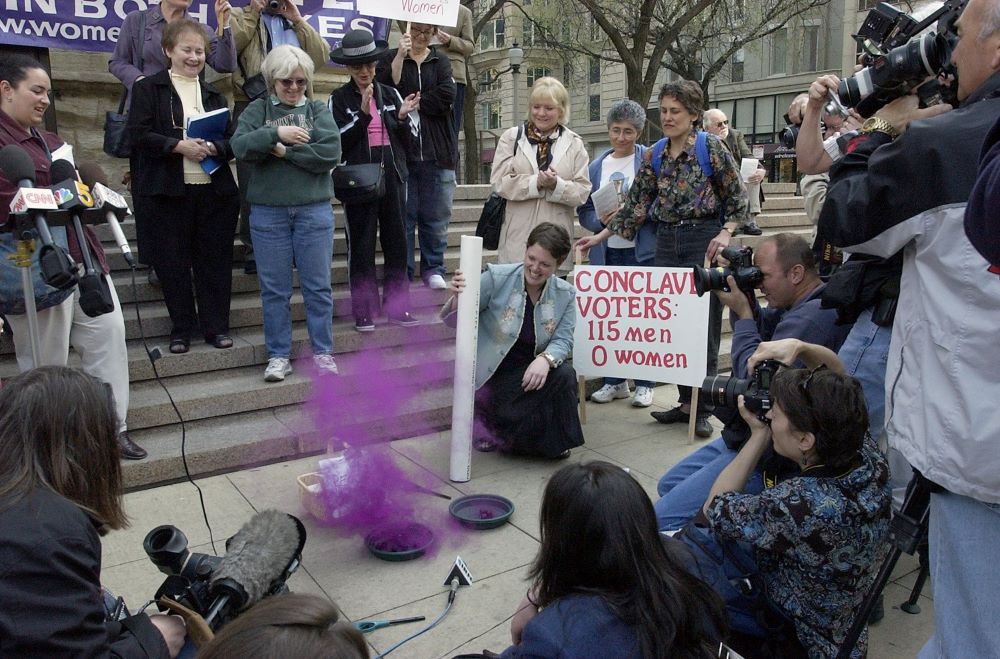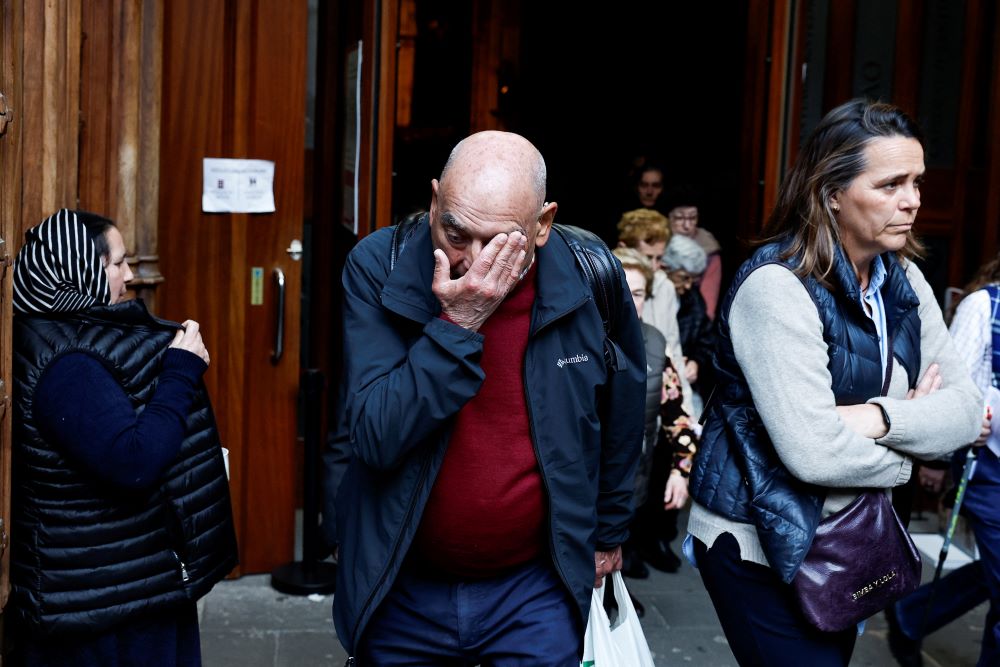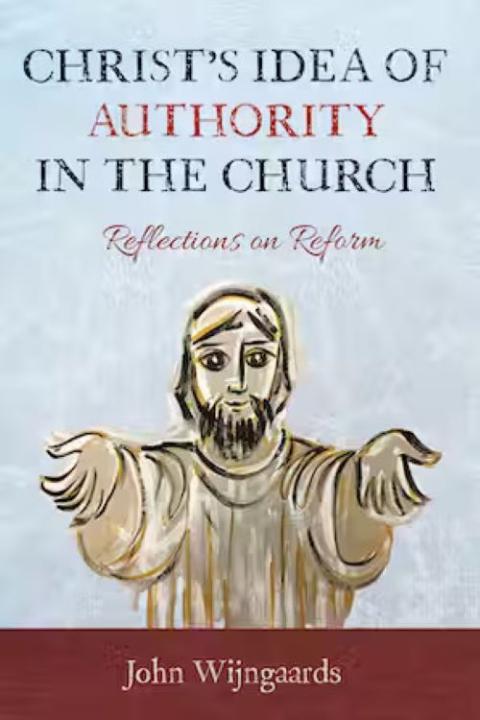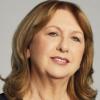
Anne Pezillo of the Women's Ordination Conference sends up "pink smoke" outside Chicago's Holy Name Cathedral April 18, 2005, to protest the exclusion of women from the Vatican conclave. The next day, cardinal electors chose Cardinal Joseph Ratzinger as pope. (CNS/Karen Callaway)
The strict hierarchical governance structure of the Catholic Church has the dubious advantage of simplicity and clarity along with increasing implausibility. Divine authority is claimed as its foundation stone with a hermeneutic of uninterrupted direct line of command from Christ himself to the pope and bishops who comprise the magisterium.
We lay members of the Catholic Church, who constitute about one-sixth of the world's population, find ourselves locked in by baptism to an authority structure of enforced obedience to the magisterium's command and control system. It is a system that claims the right to not only to make decisions which have significant and often intrusive impacts on our lives but to limit our God given human rights, especially our intellectual freedoms. At the same time, we are locked out of all decision-making and unable to hold the decision-makers to account.
Reports submitted to the Synod of Bishops 2023 from synodal discussions on five continents reveal discontent with the traditional presumption of a passive people of God who "pray, pay and obey" the magisterium.
Christ wants grace-filled, not fear-filled, faithful.
An educated laity is now generations on from the collapse of many once powerful empires and autocracies, generations into the growth of liberal democracies and, crucially, 75 years on from the leavening influence of Universal Declaration of Human Rights (1948). The U.N. document proclaims, among other rights, the inalienable natural (that is, God-given) rights of all human beings to freedom of conscience, opinion, belief and religion, including the right to change religion.
The Catholic Church's Code of Canon Law purports to give the magisterium authority to ignore and override all those inalienable human rights which international human rights law says belong to every individual church member. Not once since the promulgation of the UDHR has the magisterium confronted this fundamental disconnect between man-made canon law and the inalienable human rights which are an embedded function of the natural law, or what believers would call God-ordained individual human dignity. But the people of God have confronted the disconnect in increasing numbers, and confidence is waning in an arcane autocratic government populated exclusively by ordained men who are compulsorily celibate.

A man reacts while leaving a Mass at Santiago Cathedral in Bilbao, Spain, March 24, that was celebrated to recognize and apologize to victims of sexual abuse within the Catholic Church. (OSV News/Reuters/Vincent West)
Complaints about (among other things) the silencing of dissent, the exclusion of women from ordination and therefore all decision-making, the imposition of teachings which outlaw contraception or promote sexism and homophobia, the failure to fully include the laity in every aspect of church life whether governmental, sacramental, liturgical or catechetical, are often met with a dismissive magisterial resistance which is inclined to see such complaints as a feature of increasing secularism and an attempt to democratize the church.
Challenges to the magisterium's authority and arguments in favor of reform are often met with the blanket defense that "the church is not a democracy!" That is undoubtedly true, but it is an irrelevant argument. The church is a Christocracy, and the real question is not whether the authority structure in the church measures up to secular democracies but whether it measures up to Christ. That is the appropriate point of comparison and it is rare to find any credible detailed analysis which probes the Christ-centered authenticity of the church's authority structure.

John Wijngaards, a former priest of the Mill Hill Missionaries, authored "Christ's Idea of Authority in the Church."
An exception can be found in the work of theologian John Wijngaards, former priest and vicar general of the Mill Hill Missionaries, an experienced missionary and teacher whose persuasive book Christ's Idea of Authority in the Church (Wipf and Stock, 2023) asks some disarmingly straightforward questions, such as: Are we sufficiently aware of the fact that church authority is spiritual authority? Do we mistakenly believe that being faithful to sacred tradition means holding on to the way things were in the past? Do we not realize that, on the contrary, sacred tradition — which goes back to Jesus himself — implies the authority of church leaders to deal with new challenges and walk new paths? Do we have the courage to listen to the Spirit and pursue responsible reforms?
Wijngaards, like many in the church today, is "dismayed by the ugly accretions that attached themselves to it in the course of the centuries. Like weeds, scallops and rubbish clinging to the bottom of a ship … These cancerous growths were even enshrined in church laws."
Systematically, and with a great love for Christ and the church, Wijngaards takes the reader through a series of accessible meditations on Christ's words and deeds as they should apply to contemporary situations where skewed notions of church authority have created barriers to Christ's love.
Advertisement
His unpretentious belief in the possibility of and the need for a "different sort of authority" chimes exactly with the spiritual zeitgeist of the people of God in these synodal times. In fact, the insights and suggestions he offers would not look out of place as the basis for a truly dynamic agenda for the Synod of Bishops to be held in Rome in October 2024. There is no better vademecum, no better road map to a holier Christ-centered church for those of us journeying, listening and discerning our way through Pope Francis’ Synod on Synodality.
With modesty, pragmatism, realism and, above, all hope in the church, Wijngaards insists we must prepare for a paradigm shift from a harsh ecclesial culture of rules and regulations, of fear and enforced obedience, to a loving culture of open invitation and accompaniment that lets grace flow and that floods the hearts of the faithful. Christ wants grace-filled, not fear-filled, faithful.
If the Synod on Synodality can help the church become a believable Christocracy, maybe, just maybe, there is still a chance for this world to finally understand why God interrupted baleful, miserable human history and sent his son to help us radically reorient our lives toward the powerful light of love.








